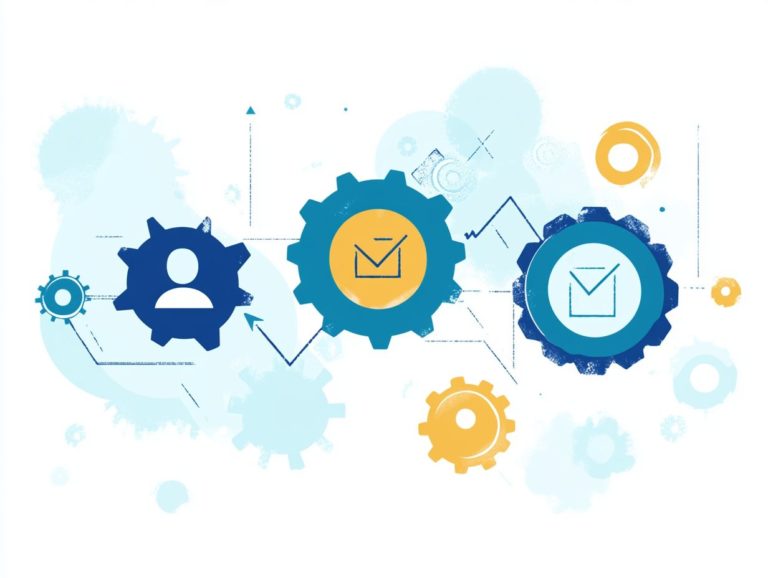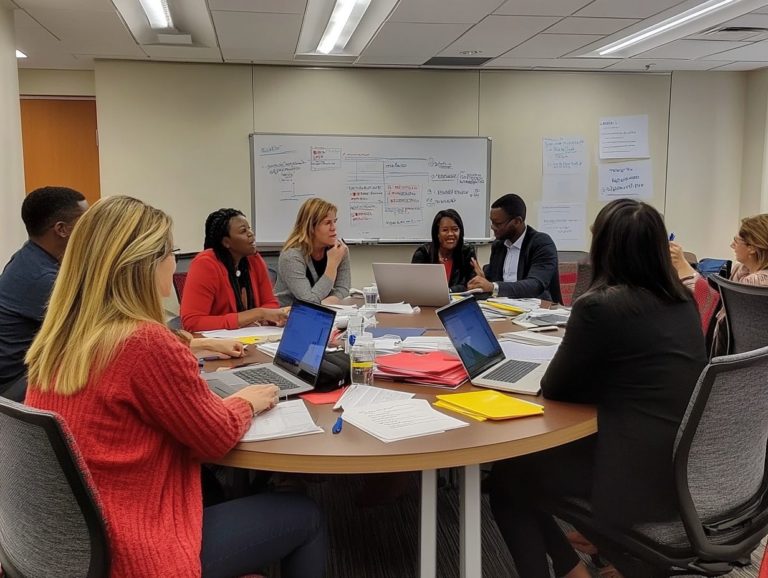The Role of Certifications in Project Risk Management
In the ever-evolving realm of project management, mastering the art of navigating risks can be the defining factor between triumph and setback.
This article reveals why mastering project risk management is essential for your success! You will discover the definition and significance of project risk management. You ll also learn about various certifications that can elevate your skills and enhance your credibility in this domain.
These certifications unlock new job opportunities today and boost your earning potential. Whether you re a seasoned expert or just stepping into the field, this guide offers valuable insights to help you advance your expertise in project risk management.
Contents
- Key Takeaways:
- Understanding Project Risk Management
- The Role of Certifications in Project Risk Management
- Certification Requirements and Process
- Maintaining Certification and Continuing Education
- Impact of Certification on Career Growth
- Frequently Asked Questions
- What is the role of certifications in project risk management?
- What types of certifications are available in project risk management?
- How do certifications in project risk management benefit professionals?
- What are the prerequisites for obtaining a certification in project risk management?
- Are certifications in project risk management recognized globally?
- Do certifications in project risk management expire?
Key Takeaways:

Understanding Project Risk Management
Project risk management is a vital aspect of your project management journey. It encompasses identifying, assessing, and responding to risks that could jeopardize your project’s success.
By embracing effective project management principles, you can adeptly navigate the intricate landscape of potential risks. These can range from organizational challenges to unforeseen factors.
This proactive approach elevates the risk management framework necessary for ensuring the successful execution of your projects.
Definition and Importance
The definition of project risk management involves a thorough method for identifying, analyzing, and responding to project risks. This is essential for optimizing your project’s success rate.
By effectively managing these risks, you enable your project team to make informed decisions. This not only safeguards project objectives but also enhances overall productivity and stakeholder satisfaction.
A thorough risk assessment allows you to pinpoint potential issues that could derail progress. Transparent communication about these risks keeps all stakeholders informed and engaged.
For example, in construction projects, a detailed risk analysis might reveal potential delays caused by weather conditions. This insight allows you to implement proactive measures, such as introducing scheduling flexibility.
Such anticipatory actions demonstrate how effective risk management strategies can mitigate setbacks. Ultimately, they lead to the successful completion of your project on time and within budget.
The Role of Certifications in Project Risk Management
Certifications are crucial for elevating your credibility and skills in project risk management. Credentials such as the PMI-RMP certification are vital for certified project managers seeking to advance their careers and stand out in a competitive landscape. For more information, check out understanding project management certifications.
Types of Certifications Available
You ll find various certifications available for project risk management professionals. The PMI-RMP and RIMS-CRMP stand out as notable options, each tailored to different facets of risk management expertise.
The PMI-RMP, or Project Management Institute’s Risk Management Professional certification, emphasizes the critical nature of identifying and assessing project risks. It also covers effective mitigation strategies. Understanding the role of technology in project management certifications can be particularly appealing if you’re a project manager looking to sharpen your skills in risk analysis and improve your project outcomes.
Conversely, the RIMS-CRMP, or Risk and Insurance Management Society’s Certified Risk Management Professional designation, takes a broader approach to enterprise risk management. It dives into insurance implications and strategic decision-making across various organizational contexts.
Both certifications carry considerable prestige in the industry. They allow you to showcase your advanced knowledge and unwavering commitment to proficiently managing risks.
Benefits of Certification

Achieving a project management certification can unlock significant benefits for you. These range from enhanced risk management skills to an impressive increase in your earning potential.
Certified professionals like you become more competitive in the job market. This qualification provides essential tools to identify, assess, and mitigate risks effectively. It also showcases your commitment to ongoing professional development something employers greatly value.
Certifications like Project Management Professional (PMP) or Risk Management Professional (PMI-RMP) are highly regarded. They can pave the way for higher salary offers and better job opportunities.
Imagine earning an average salary increase of 20%! This can significantly boost your financial future, underscoring how these credentials serve as a powerful differentiator in a crowded marketplace.
Certification Requirements and Process
To achieve certification as a project manager, specifically for the PMI-RMP certification, you must meet certain eligibility criteria and pass the risk management certification exam.
This journey requires dedication and can lead to amazing opportunities. It also demands a thorough understanding of the intricacies of risk management in project settings.
Eligibility Criteria
To qualify for the PMI-RMP certification, you must meet specific eligibility criteria, including relevant project management experience and educational qualifications.
Typically, you should have a secondary degree, such as a high school diploma or an associate degree, along with at least 4,500 hours of experience leading and directing projects related to risk management. If you hold a four-year degree, you can qualify with just 3,000 hours of similar experience.
You must also complete at least 30 hours of formal education in risk management practices. This structured background ensures that you are well-equipped with the skills and knowledge to effectively address project risks as you pursue the PMI-RMP certification.
Exam Format and Preparation
The exam format for the PMI-RMP certification comprises multiple-choice questions designed to evaluate your knowledge and application of risk management principles.
You will encounter 170 questions covering a range of topics, including risk identification, assessment, and response strategies. With four hours allotted for the exam, you ll have plenty of time to ponder and thoughtfully respond to each question.
Your score will reflect the number of correct answers, with a minimum passing score determined by PMI according to exam statistics.
To prepare effectively, consider utilizing study guides, practice exams, and online forums where you can gain insights and share experiences with fellow candidates.
Engaging in study groups can further enhance your understanding. Resources such as PMI s official handbook and exam content outline will provide invaluable guidance on the essential topics you need to master.
Maintaining Certification and Continuing Education
To maintain your certification in project risk management, it s essential to engage in continuing education and follow the renewal process established by certification bodies such as PMI.
This commitment enhances your skills and ensures you remain at the forefront of industry standards.
Renewal Process

The renewal process for PMI certifications entails submitting proof of continuing education units (CEUs) and adhering to PMI’s maintenance guidelines. CEUs are credits earned through educational activities that help maintain certification.
To navigate this important procedure effectively, you need to accumulate at least 60 CEUs over the three-year certification cycle. You can achieve this through various avenues, such as attending workshops, enrolling in online courses, or engaging in relevant professional activities.
Once you ve gathered your CEUs, accurately record them in PMI’s online certification management system. You ll also need to provide proof of completion, which can include certificates or transcripts.
By diligently following these steps, you can ensure compliance with PMI’s standards and maintain your professional designation with ease.
Start your certification journey now and unlock your potential!
Continuing Education Requirements
Continuing education requirements for maintaining your project risk management certification typically require you to earn a specific number of Continuing Education Units (CEUs) within a designated timeframe. These requirements validate your knowledge and encourage ongoing learning in a field that s constantly evolving.
Engaging in professional development through courses, workshops, and conferences can significantly enhance your skills. It also keeps you informed about the latest industry standards and practices.
A variety of organizations offer a wealth of options for earning CEUs, including:
- Online modules that provide the flexibility you need amidst a busy schedule
- In-person training sessions that create valuable networking opportunities
- Specialized seminars tailored to address emerging trends in risk management
By actively pursuing these educational avenues, you not only keep your credentials but also position yourself as an informed leader in your field!
Impact of Certification on Career Growth
The impact of certification on your career growth is substantial. It not only bolsters your credibility as a project management professional but also offers you a distinct competitive edge in the job market.
This advantage can ultimately lead to increased earning potential, elevating your professional standing.
Advantages in the Job Market
Certification brings distinct advantages in the job market, as employers typically prefer hiring certified project management professionals due to their demonstrated skills in managing project risks.
In today s competitive landscape, obtaining certification enhances your credibility and significantly boosts your marketability. A PMI report reveals that organizations led by certified project managers enjoy 20% higher project success rates. This statistic underscores why many employers actively seek out certified individuals; they are often linked to lower project costs and reduced timelines.
Certifications signal a commitment to continuous improvement and professional development traits that resonate well with hiring managers. As a result, candidates with certifications often enjoy greater job stability and greater opportunities for advancement across various industries, making them invaluable assets in any organization.
Higher Earning Potential
One of the standout advantages of obtaining certification in project risk management is the impressive increase in earning potential. Many certified professionals report notable salary boosts compared to their non-certified counterparts.
Recent studies reveal that individuals with professional certifications can anticipate earning, on average, 20% to 30% more than those lacking these qualifications. For example, industry surveys show that certified project managers often enjoy starting salaries exceeding $90,000 annually, while non-certified professionals typically earn closer to the $70,000 range.
This disparity highlights the substantial financial benefits of securing certification, particularly in competitive fields where expertise in risk management is in high demand. As organizations increasingly seek qualified professionals to adeptly handle project risks, certification holders not only elevate their own earning potential but also establish themselves as invaluable assets to their employers.
Frequently Asked Questions

What is the role of certifications in project risk management?
Certifications ensure that project managers have the necessary skills to manage risks effectively.
What types of certifications are available in project risk management?
There are various certifications available, such as the Project Management Professional (PMP), Certified Associate in Project Management (CAPM), and Risk Management Professional (PMI-RMP).
How do certifications in project risk management benefit professionals?
Certifications demonstrate a professional s expertise and credibility in the field, making them more competitive and increasing their earning potential.
Start your journey in project risk management today your future self will thank you!
What are the prerequisites for obtaining a certification in project risk management?
To get certified in project risk management, you typically need years of project management experience. You also need to complete a certain number of hours in project risk management education.
Are certifications in project risk management recognized globally?
Yes! Most project risk management certifications are recognized worldwide. Organizations like the Project Management Institute (PMI) and the International Project Management Association (IPMA) offer these certifications.
Do certifications in project risk management expire?
Yes, most certifications have a time limit. You must recertify by completing continuing education or retaking the exam to keep your skills up to date.






